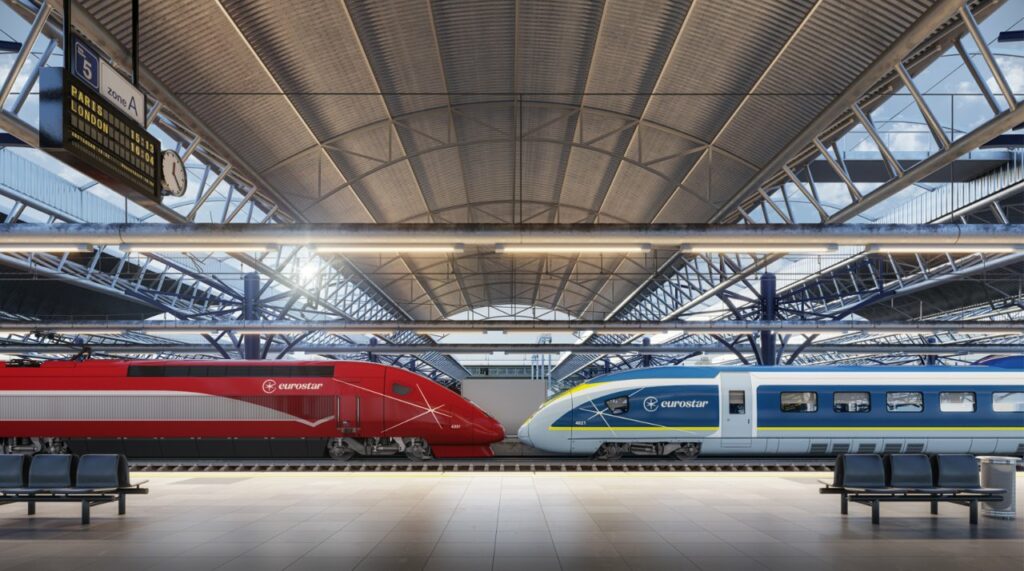BRUSSELS BEHIND THE SCENES
Weekly analysis with Sam Morgan
Back on track
2023 might be a strong year for Europe’s train networks, as promising plans and green priorities point towards a burgeoning rail renaissance. But there may yet be leaves on the line.
The European Union designated 2021 the ‘Year of Rail’ and intended to use that 12 months as an ignition spark for a rethink of how train travel is leveraged across the continent. It didn’t really pan out that way.
Restrictions imposed by the Covid pandemic were still in place, travel was not at the top of priority lists and the events planned to commemorate the year were nothing more than marketing exercises.
Nothing particularly tangible resulted immediately from 2021’s festivities, unfortunately. However, this year has begun with rather meatier developments that point towards a smoother ride ahead.
BRUSSELS BEHIND THE SCENES is a weekly newsletter which brings the untold stories about the characters driving the policies affecting our lives. Analysis not found anywhere else, Sam Morgan helps you make sense of what is happening in Brussels. If you want to receive Brussels behind the scenes straight to your inbox every week, subscribe to the newsletter here.
Trains are great aren’t they? When they run on time they can get you where you need to be, stress-free and slightly smug about the small contribution you’ve made to saving the planet.
Emmanuel Macron and Olaf Scholz tend to think the same way it seems. In a joint declaration made after a big meeting this week, both leaders pledged their support for plans to link Paris and Berlin with a direct high-speed link.
You can reach the two capitals by train at the moment, but it requires changing in either Frankfurt or Cologne. The proposal for a direct train could shuttle passengers from the Eiffel Tower to the Fernsehturm in just over seven hours.
That is competitive with a plane trip, given the transfer times to Paris and Berlin airports and the waiting times needed at the point of departure. Costs will be an issue but aren’t they always.
German and French railways had planned to launch the link by the end of 2023 but the Scholz-Macron document refers to 2024, confirming its delay. But with such potent political backing, the chances of it actually happening are better than ever.
What is needed now is an honest conversation about state aid and support, as Europe’s rail network is only going to thrive if non state-owned firms are allowed to compete on a level playing-field, a perk that has been rarely afforded to third-party companies.
The European Commission is updating its state aid rules in the coming weeks and months. Although the focus will be more on industry and reacting to the United States’ manoeuvres, all these sectors are interlinked and play off of one another.
Trans-Balkan Express
Earlier this week, the heads of Croatia, Serbia and Slovenia’s railway companies met to discuss reopening direct trains between their three capitals: Zagreb, Belgrade and Ljubljana.
Trains currently run between Zagreb and Ljubljana — now without the need to endure passport controls on board thanks to Croatia’s Schengen membership — but there is no train that goes on towards Belgrade.
That service was cancelled amid the Covid pandemic and has not been resurrected since, with Serbian officials claiming that it is the fault of their Croatian counterparts. Perhaps this week’s meeting will have cleared the air somewhat.
Signs are positive that there is room for progress, as Austrian railway’s cargo division tested freight trains between Croatia and Serbia this week too. It will open up new routes from Greece and Turkey into Central Europe.
Trains are still very much a work-in-progress in the Balkans: Montenegro and Serbia seem more keen on building new motorways with the help of Chinese investors; Croatia’s network is sparse; and Albania barely has any railroad at all.
There is plenty of EU money that can be invested in rail, governments just need to be steered in the right direction. That is easier said than done though.
British Fail
Britain invented train travel (citation needed) but has apparently lost its knack for planning and operating big infrastructure projects. Eurostar and the controversial High Speed 2 line are proof of that unfortunate state of affairs.
The cross-channel rail operator completed its merger with Thalys this week, unveiling new branding and pledging growth across its combined network, which runs between London, Paris, Brussels, Amsterdam and Cologne.
But that growth isn’t going to come from the Eurostar routes, as existing services are completely hamstrung by the impacts of Brexit.
Reports this week revealed that trains run two-thirds empty from Amsterdam because of the requirements imposed by more stringent passport checks. London’s St Pancras terminal was never meant to be a hard border and simply cannot cope.
That means that for every couple of tickets sold, a seat needs to be left vacated so that queues do not cripple the station’s infrastructure at peak times and cause delays to multiple services. A sorry state of affairs.
Looking northward from London, the HS2 project has also moved onto its latest pratfall. Reports suggest that the terminus will no longer be in central London, completely defeating the point of the high-speed link.
A bloated budget has already scrapped plans to go even further north towards Scotland and a planned stretch to Leeds has been cancelled. The government has not yet denied the rumours.
Railways require investment, there’s no getting away from that. But the eventual immense benefits – both financial and societal – of increased services and more passengers are clear to see.
BRUSSELS BEHIND THE SCENES is a weekly newsletter which brings the untold stories about the characters driving the policies affecting our lives. Analysis not found anywhere else, Sam Morgan helps you make sense of what is happening in Brussels. If you want to receive Brussels behind the scenes straight to your inbox every week, subscribe to the newsletter here.

